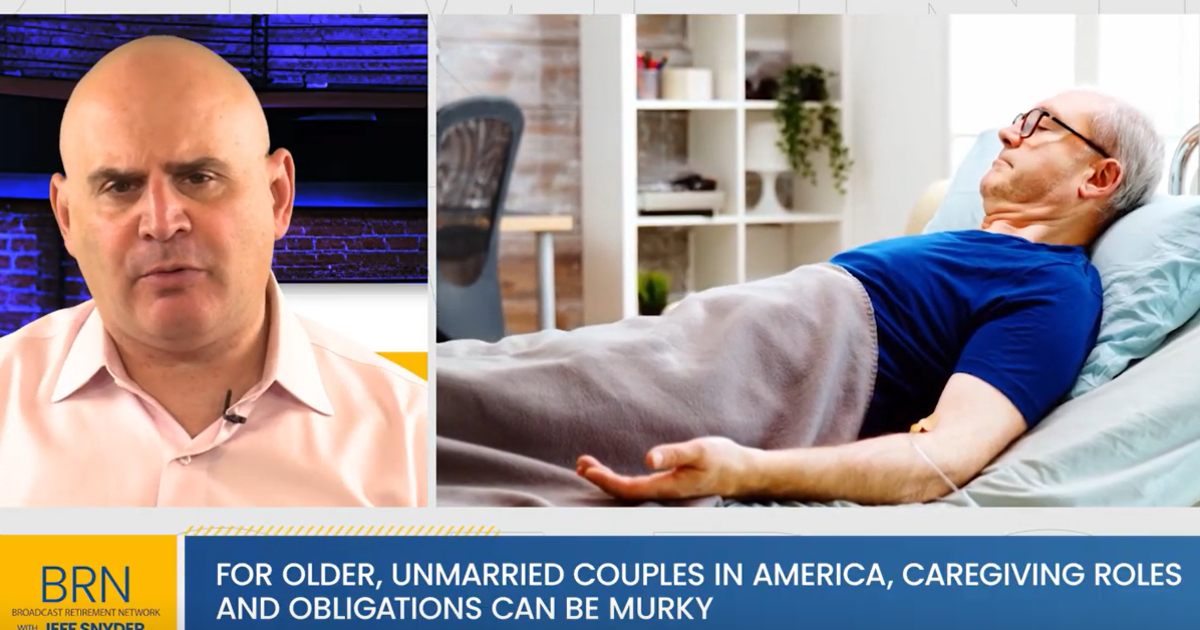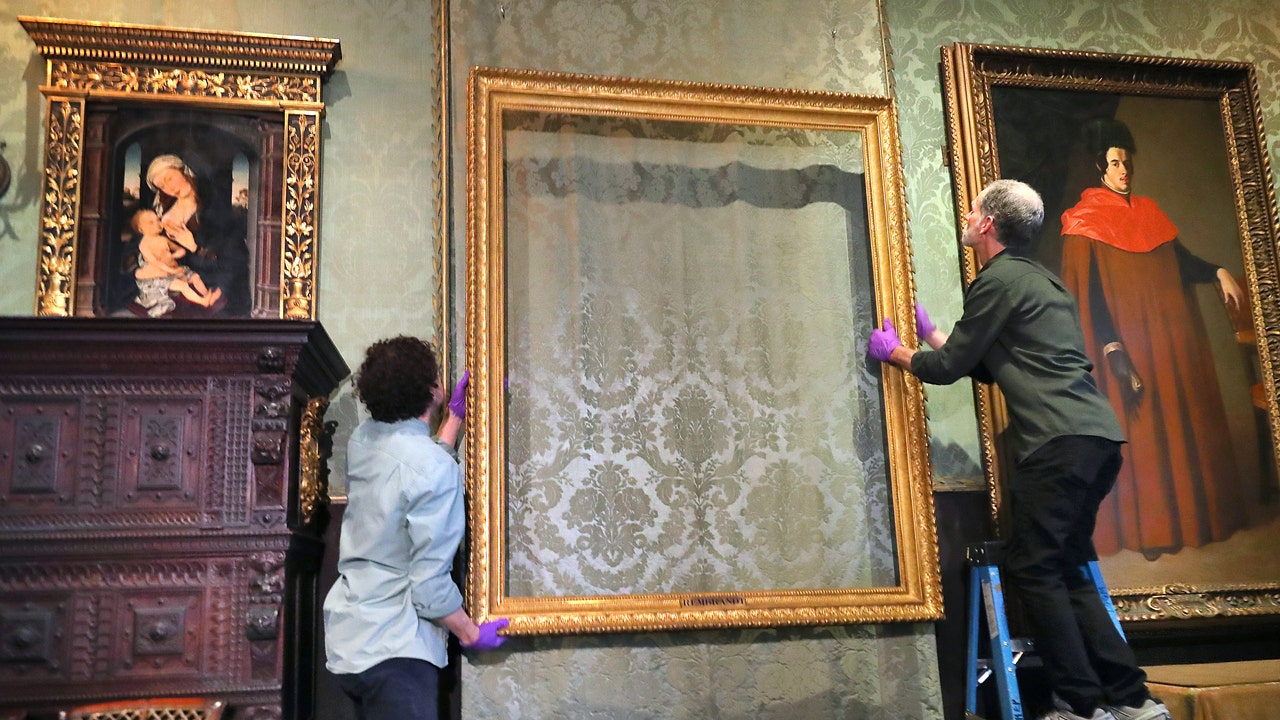Copyright The Street

Eventually, most older couples will face health crises and the need for caregiving Broadcast Retirement Network’s Jeffrey Snyder discusses how unmarried, older couples can handle caregiving roles with Norris McLaughlin, PA’s Shana Siegel. Jeffrey H. Snyder, Broadcast Retirement Network This morning on BRN Lifestyle, for older, unmarried couples in America, caregiving roles and obligations can be murky. Joining me now to discuss this is Shanna Siegel of Norris McLaughlin. Shanna, so great to see you. Thanks for joining us on the program this morning. Oh, sure. Great. Thanks for having me. Yeah, this is a, you know, caregiving, obviously it’s an important topic. It’s becoming more prevalent in society. I want to ask you about unmarried caregivers. This seems to be a growing population of people, and I would imagine fraught with some challenges from a legal and caregiving perspective. Shana Siegel, Norris McLaughlin PA Absolutely, yes. I am seeing more and more clients that, where they’re unmarried, and, but, you know, a serious long-term relationship, and that is much more common, and it does have a lot of different challenges than when you’re dealing with married caregivers. Jeffrey H. Snyder, Broadcast Retirement Network And can we talk about some of those challenges? You know, in just thinking about this anecdotally, you know, it could be a partnership, a partnership after a marriage for both individuals. Maybe there are some children involved, but what are some of the common hang-ups or concerns that families might have when it comes to these types of relationships? Shana Siegel, Norris McLaughlin PA Sure. Well, the first thing is, who has authority to make decisions? So, you know, if the couple has not taken the time to do or redo their healthcare documents, their estate planning documents, then there can be some issues that emerge in terms of who has the authority to make decisions, whether that’s healthcare decisions, you know, who’s dealing with the doctors, or if we’re talking about financial issues, you know, who has power of attorney. So that can be the first thing that can really be challenging. And, of course, you know, often there are children from prior relationships, and so there can be some conflicts there. But beyond going with the legal issues and the, you know, who has legal authority, there’s just a lot of practical issues in terms of what happens when one member of the partnership is, you know, ill. And, you know, that may not be what their partner signed up for in terms of being a caregiver. So I’ve seen situations where the adult child is making the decisions, and they assume that their parent is going to go home to the home that they share with the partner and that the partner is going to care for them, and that may not be what the partner had, you know, signed up for. And I’ve also seen the reverse where the adult child says, you know, oh, okay, now they’re going to go into a facility, and now all of a sudden that home that they’re residing in maybe has to be sold, and what does that mean for, you know, the healthy partner? So there’s a lot of issues that can emerge in those kinds of scenarios. Jeffrey H. Snyder, Broadcast Retirement Network Yeah, it certainly sounds like it, and maybe people didn’t really think about this when they were, look, I mean, you get together because you like somebody, you want to be, you just get along, you like camping, hiking, it makes sense. How do you put some guardrails around this, Shanna? Because it’s kind of a new world where maybe people come together, they don’t get married, they probably don’t think about this. I mean, how do you put guardrails around this to ensure that when you get to this point, you’re not caught off guard in like an emergency situation? Shana Siegel, Norris McLaughlin PA Yeah, yeah. Well, I think the first thing is to have those conversations, right? It’s never something that, you know, as you said, you may not think about or maybe you just, you know, want to kind of avoid those conversations, but, you know, it’s always the best to have those conversations about, first of all, what would I want, you know, in terms of end-of-life decisions, in terms of caregiving, in terms of how important is it for me to be at home? Who do I think will, you know, will be providing care? You know, I think all of those conversations are things that need to happen. Ideally, sitting down with the extended family so that, you know, those adult children are on the same page as, you know, as the partner. And then, you know, if necessary, having documents that support that. So if the partner is going to be involved in any of those healthcare decisions or any financial decisions, that the documents reflect that. You know, I’ve had clients come to me where they have had kind of a pre-nup, but not where, you know, not really focusing so much on the financial issues, but dealing with these type of issues and addressing, particularly if you’re going to be residing in a home together and only one person is owning it, or even if it’s a joint ownership, you know, okay, what’s going to happen? How are we going to address these type of issues? So many times only one person owns the home and then, you know, is there any protection for that partner if in the event of the death or the illness of, you know, the primary owner? So, you know, that’s something that really, you know, having a trust or something that some vehicle that addresses it is really important. Jeffrey H. Snyder, Broadcast Retirement Network And you don’t have to be a wealthy person, Shanna, right, in this situation. I mean, we’re just talking about these are just the basic things you probably need to do even if you’re not a billionaire just to protect yourself and the other person. Is that correct? Shana Siegel, Norris McLaughlin PA Yeah, no, I think there is a real misunderstanding that estate planning is only for the wealthy. But I’ll tell you that I have had client situations where, you know, people of very modest means end up having their estate spend everything that there is in order to address these type of issues because they didn’t do estate planning. So, you know, when there is no spouse, there is no adult child, it’s really the most important time to do the estate planning. And, of course, any situation like we’re talking about here where you’ve got an unmarried partner because, you know, there’s just so many things that are going to come up and you’re going to have to resolve them legally one way or another. And so, you know, it’s always going to be the least expensive to address it upfront rather than, you know, potentially there being some kind of litigation or, you know, just kind of mess afterwards. Jeffrey H. Snyder, Broadcast Retirement Network And, Shanna, I mean, you could always amend these documents in the future. So, you know, I know my wishes have changed over the years in terms of how I want certain things handled because my perspective has changed. You can draft these documents, for example, in your 40s and 50s. And then when you get to your 60s and 70s, meet with somebody like yourself and revisit them again. That’s probably common, too. Shana Siegel, Norris McLaughlin PA Yeah, and I think that’s really important because, as you said, what your thoughts are as a 40-year-old are very different from where they may be when you get older, both in terms of your relationships, your relationships with, you know, adult children, relationships with any partners, but also just your general perspective on, you know, what is a good quality of life, how you would want your, you know, issues to be addressed. I also find that a lot of individuals who are solo are single individuals. There’s kind of some issues that surround that that should be addressed in your estate planning. So, for instance, ways to minimize the chance of financial exploitation, the ways to, you know, ensure a lot of, you know, younger single people might not have a power of attorney, but as they age, that is something that’s, you know, really important for everybody to have. So, yes, absolutely. Jeffrey H. Snyder, Broadcast Retirement Network And look, I think this is the calm before the storm. We have an aging America, just like every other society around the world. We’re all going to be caregivers at some point in our lives. It’s best to get ahead of this, I think. I think you’re going to be a pretty busy person, Jenna. Shana Siegel, Norris McLaughlin PA Yeah, no, I think you’re right. I think that it is, we’re seeing more and more non-traditional relationships, people not married, and people living longer and longer. So the longer that you’re living, the more likely it is that you’re going to have a number of different relationships in your life. So it’s really important to address it and help, you know, avoid any of the messy problems that can happen if you don’t. Jeffrey H. Snyder, Broadcast Retirement Network Yeah, it just can get so ugly. And Jenna, just to kind of close out, so many of us are living further away. You know, we’re spread out across the United States and even around the globe. Sometimes we can’t be close to our loved ones. I live in Charlotte. My family lives in Baltimore. It’s seven hours. It’s a 45-minute flight, but that’s not quick. I can’t just run over to my mom’s house and say, how can I help? So this is probably pretty needed. Shana Siegel, Norris McLaughlin PA Yeah, no, absolutely. I think that, you know, the days when your children were living, you know, on the same block as you, that’s very unusual these days. And there are a lot of contingencies that you can put in place to address emergencies until that family member can come to you, assuming that you do have somebody who can do that. So, you know, whether we’re talking about a care manager, whether we’re talking about, you know, other kinds of emergency plans, there’s a lot that can be done to give you that peace of mind. So it’s important to work with professionals who are familiar with these situations and, you know, can give you some advice about how to address your particular situation, because everybody’s is a little bit different. Jeffrey H. Snyder, Broadcast Retirement Network Yeah, we’re all individuals, and hence, as you said, circumstances are individual as well. Shanna, we’re going to have to leave it there. Thanks so much for joining us, and we look forward to having you back again very soon. Great, thanks so much, Jeff. And don’t forget to subscribe to our daily newsletter, The Morning Pulse, for all the news in one place, details at our website. And we’re back again tomorrow for another edition of BRN. Until then, I’m Jeff Snyder. Stay safe, keep on saving, and don’t forget, roll with the changes.



